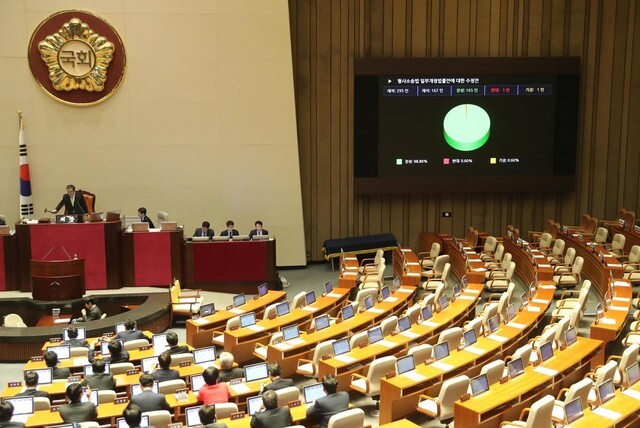Posted on : Jan.14,2020 17:20 KST
 |
|
National Assembly Speaker Moon Hee-sang announces the passing of an amendment that limits the authority of prosecutors to direct police investigations on Jan. 13. (Kang Chang-kwang, staff photographer)
|
Revised Criminal Procedure Act, Prosecutors’ Office Act give police more independence
 |
|
National Assembly Speaker Moon Hee-sang announces the passing of an amendment that limits the authority of prosecutors to direct police investigations on Jan. 13. (Kang Chang-kwang, staff photographer)
|
The Criminal Procedure Act, which states that police are subject to the direction of prosecutors for all investigations, has been amended after 65 years. The key change is the abolition of its terms regarding prosecutors directing police investigations before cases are officially referred to them. In addition to the Criminal Procedure Act, the Prosecutors’ Office Act now includes new terms limiting the scope of direct investigations by prosecutors. The National Assembly’s passage of the two bills guaranteeing police primary investigation rights and termination rights means that the long journey of adjusting the investigative authority of prosecutors and police has finally borne fruit.
One particularly notable feature of the amended Criminal Procedure Act passed by the National Assembly’s regular session on Jan. 13 was its stipulation of the “cooperative relationship” between prosecutors and police. Article 196 of the act, which states that judicial police officers “shall receive instructions from a prosecutor with regard to all investigations,” had remained unchanged since it was first enacted on Sept. 23, 1954. The latest change transforms the relationship between the two investigative bodies from one of command to one of cooperation by granting police primary investigation authority and termination authority. While some observers argue that the changes aren’t enough, it marks the realization of something police have been demanding for decades.
Amendment realizes “cooperative relationship” between prosecutors and police
Additional terms state that the police can apply for a review by a warrant review committee within a particular high prosecutors’ office if, without legitimate grounds, prosecutors decline to submit a warrant request to a judge for any warrants they apply for. Another major change stemming from the amendment is a provision stating that suspect protocols of examination drafted by prosecutors may only be used as evidence with the content of the defendant and/or their counsel.
Various mechanisms were also instituted to serve as checks on judicial police officers. The new terms state that prosecutors may demand supplementary investigation as needed to present and sustain an indictment or request a warrant, which prosecutors are to carry out without delay unless they have “legitimate grounds” not to do so. If police officers do not comply without legitimate grounds, the Public Prosecutor General or a Prosecutors’ Office director may demand that the officers in question be removed from duties or disciplined. At the same time, the vagueness of the wording about “legitimate grounds” is being seen as a possible source of conflict or debate between police and prosecutors going forward.
The amended terms also stipulate that police are obligated to inform suspects before questioning that they “are entitled to request restitution from prosecutors in cases of legal violations, human rights infringements, and/or clear abuses of investigative authority during the investigation process.” Upon receiving a report, prosecutors may demand that the police submit a copy of their case record.
Restrictions were applied to the scope of direct investigations by prosecutors. The amended Prosecutors’ Office Act limits the scope of direct investigations by prosecutors to categories including major crimes as defined by presidential decree (including corruption, economic crimes, crimes by public officials, and crimes related to elections, the defense industry, and major disasters) and crimes committed by police officers. For all other ordinary criminal cases, the police are to effectively hold primary investigation authority and termination authority. While they will continue to refer cases to prosecutors once criminal charges have been established, in cases of non-referral prosecutors may receive evidence and documentation of the grounds for the decision but are obligated to return them to judicial police officers within 90 days. Prosecutors may also request reinvestigations in cases where the non-referral of a case by judicial police officers is deemed illegal or unjust.
Fine-tuning still needed going forward
Some areas will need to be fine-tuned by enforcement decrees and other means going forward. In particular, the new system allows for a potentially endlessly repeated process of prosecutors requesting reinvestigation again when police decline to refer a case despite a previous reinvestigation request by prosecutors. For this reason, the ruling and opposition party lawmakers who submitted the revised plan for adjusting police and prosecutors’ investigation authority on Dec. 30 of last year also issued an agreement stating that they would “establish detailed investigation regulations to prevent repeated reinvestigation requests.”
The lawmakers also agreed to introduce a self-governing police system to prevent the police organization from becoming too large, as some have contended, and to work without delay to legislate bans on involvement and interference in judicial police officer duties by police who are not responsible for such duties, along with guarantees on investigation independence and neutrality. A bill for police reforms including the introduction of a self-governing police system, creation of a state investigation headquarters, and the removal of regulations concerning the collection of security-late information by intelligence police is currently pending in the National Assembly Public Administration and Security Committee and Policy Committee.
By Seo Young-ji, staff reporter
Please direct comments or questions to [english@hani.co.kr]










